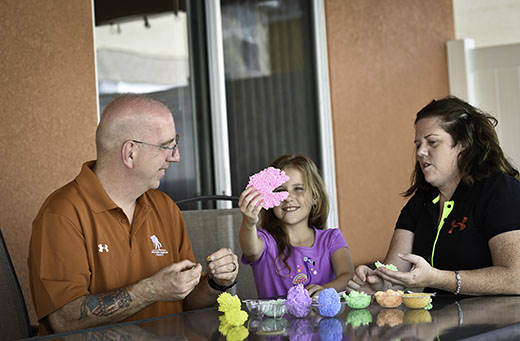Together Again: A Veteran Couple’s Journey Through Life’s Ups and Downs

Meet veterans Jim and Jana Mylott. They have been together for 19 years and have a daughter and an adult son from Jim’s previous marriage. Jim is an Army veteran and Jana is an Air Force veteran.
They met at a time of transition for Jim, while he awaited medical retirement and was beginning to grapple with invisible injuries. Jim was injured in a car bomb attempt in Iraq. He deals with traumatic brain injury (TBI), lost his memory for a while, had a long rehab from his physical injuries, and continues to manage post-traumatic stress disorder (PTSD).
Despite adversity, throughout their military and civilian careers as well as personal lives, both Jim and Jana have been united by their commitment to service. More recently, they even opened their home to three young people who needed food and shelter, helping them get on their feet and watching them move on to pursue their dreams.
“I never thought I would like such a busy household,” Jana said. “Now I think it might be a bit quiet.”
They give generously regardless of whether their lives are “perfect.” Jim is active as a veteran advocate through Wounded Warrior Project® (WWP). Jana is a family and children’s counselor, and a gun safety officer. Their marriage has had its ups and downs – in fact, they separated and divorced at one point.
“The relationship came to a point where we had tried everything. We had gone to counseling, yet we were fighting and were not sleeping in the same room,” Jana recalled.
“But after we divorced, we missed each other, and we felt that we owed it to the kids to try. It was not a hard decision to try again.”
Second Time Around
Their reconciliation came after attending a couples Project Odyssey®, a 12-week WWP mental health program that empowers injured veterans and their significant others to develop skills to improve their relationships.
“After attending couples Project Odyssey, we realized we were both listening to reply,” Jim said. “We were not listening to take in what the other person was saying. Now, we’ve learned to communicate better and tell each other how we feel in the moment. We don’t hold grudges anymore.
“With me dealing with TBI, I didn’t always realize when I had done something annoying. She would put up with it and hold it in. Now she lets me know right in the moment.”
They also learned to use humor to diffuse tense moments. Jim says that to an observer, it may look like a comedic routine, but “that’s how we deal with disagreements – we make fun of each other and sometimes even exaggerate until the argument turns ridiculous and we end up laughing.”
Jim had previously attended an all-male Project Odyssey to address his PTSD and TBI. That initial experience helped him see he was not alone and he found a support network through WWP.
During a couples Project Odyssey, the focus is on relationships. Veterans and their significant others first participate in a multi-day mental health workshop focused on the effects of PTSD, TBI, and other combat stress on relationships. Through adventure-based activities and mental health education, couples learn more about communication, conflict management, and shared meaning, among other concepts. The following 12 weeks of the program provide continuous coaching from WWP staff to reinforce what was learned during the initial portion.
“Project Odyssey made us want to be together again,” Jim said. “We learned how to communicate better. Everybody argues, but it is how you argue that counts. You can have a debate and not a screaming match. It’s OK to put something on the table and come back when you’re able to respond – this is helpful when communicating with anyone. Give yourself time to breathe and think about it. When you’re angry, you’re not thinking.”
Mending relationships is a positive effect of couples Project Odyssey.
“I don’t think we had to convince each other to come back,” Jana said. “I think we had to spend time apart to heal ourselves and reflect. Project Odyssey helped us see we weren’t alone and that being together – even when we struggled together – was a good thing.”
“I would like to tell other veteran couples that there are resources like Project Odyssey out there and there are opportunities for veterans to get away and figure things out. Don’t be too proud to ask for help.”
Wounded Warrior Project® (WWP) offers mental health services for veterans and families coping with the invisible wounds of war. Some of these free services include WWP Talk, a one-on-one emotional support program via phone; and Project Odyssey®, a 12-week program that uses adventure-based learning to help warriors manage and overcome their invisible wounds. Get connected today or read more about how WWP helps.
Contact: Raquel Rivas – Public Relations, rrivas@woundedwarriorproject.org, 904.426.9783
About Wounded Warrior Project
Since 2003, Wounded Warrior Project® (WWP) has been meeting the growing needs of warriors, their families, and caregivers — helping them achieve their highest ambition. Learn more.